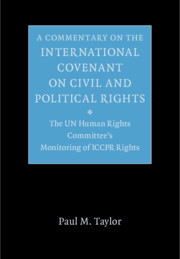 A Commentary on the International Covenant on Civil and Political Rights
A Commentary on the International Covenant on Civil and Political Rights Published online by Cambridge University Press: 11 June 2020
Article 20(2) mandates that any ‘advocacy of national, racial or religious hatred that constitutes incitement to discrimination, hostility or violence shall be prohibited by law’.
Although Article 20 addresses both racial hatred and religious hatred, they possess different characteristics, and restrictions on each give rise to a dissimilar set of implications. This is reflected in the development of UN instruments on the subject. Following various anti-Semitic incidents in the early 1960s, the General Assembly passed a resolution calling for the preparation of a draft Declaration and a draft Convention on the elimination of religious intolerance. Simultaneously, a draft Declaration and a draft Convention were advanced on the elimination of racial discrimination in the knowledge that issues of racial discrimination could be progressed swiftly with the removal of content relating to religious intolerance.
To save this book to your Kindle, first ensure no-reply@cambridge.org is added to your Approved Personal Document E-mail List under your Personal Document Settings on the Manage Your Content and Devices page of your Amazon account. Then enter the ‘name’ part of your Kindle email address below. Find out more about saving to your Kindle.
Note you can select to save to either the @free.kindle.com or @kindle.com variations. ‘@free.kindle.com’ emails are free but can only be saved to your device when it is connected to wi-fi. ‘@kindle.com’ emails can be delivered even when you are not connected to wi-fi, but note that service fees apply.
Find out more about the Kindle Personal Document Service.
To save content items to your account, please confirm that you agree to abide by our usage policies. If this is the first time you use this feature, you will be asked to authorise Cambridge Core to connect with your account. Find out more about saving content to Dropbox.
To save content items to your account, please confirm that you agree to abide by our usage policies. If this is the first time you use this feature, you will be asked to authorise Cambridge Core to connect with your account. Find out more about saving content to Google Drive.